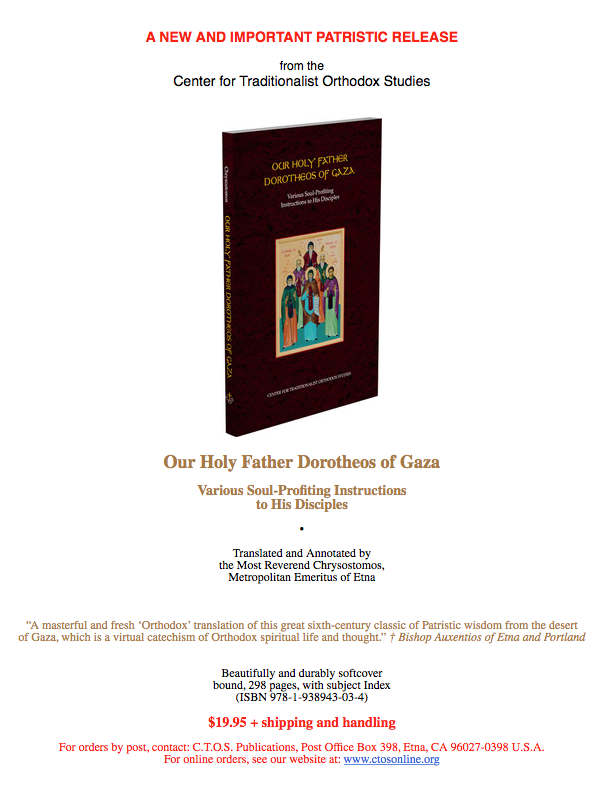

•
Ruling Hierarch
•
Monastic Communities
•
Parishes and Missions
•
Institutions and Resources
•
Clergy
•
Ecclesiology
•
Guidelines
•
Articles and Readings
•
Links
•
News
•
Statistics
•
Legal Counsel
•
Frequently Asked Questions

News archives: 2015, 2016, 2017, 2018, 2019
• October 3, 2017:
Harvard and Oxford-Trained Classics Scholar to Speak at St. Photios
Orthodox Theological Seminary on Friday Evening
Professor John V. Petropoulos, Director of Harvard University's Center for Hellenic Studies in Nafplion, Greece, will deliver a short lecture at 7:30 on Friday evening, October 6, 2017, at the auditorium of the St. Photios Orthodox Theological Seminary in Etna. The lecture is free of charge and open to the community. He will speak on the relationship between ancient Greek culture and early Christianity and how these two factors in the development of western civilization confronted one another.
Dr. Petropoulos, an Adjunct Professor at the seminary, has been in Etna for several weeks, teaching a seminar for Master's students. He has kindly consented to offer a public lecture on the eve of his departure for Greece, where he also holds a Professorship in Ancient Greek Literature at the University of Thrace.
A graduate of Harvard University, Professor Petropoulos earned his doctoral degree in Classics at Oxford University. His latest book, published by the Harvard University Press, is Kleos in A Minor Key: The Homeric Education of a Little Prince. He also recently co-authored a book on the Classics and Christianity, The Sculptor and His Stone, published by Pickwick Books, with the Most Reverend Dr. Chrysostomos, former Metropolitan of Etna, and two other professors at the St. Photios Seminary.
____  ____
____
• September 29, 2017:
A NEW AND IMPORTANT PATRISTIC RELEASE
____  ____
____
• August 3, 2017:
Tonsure of a Nun at the Convent of the Holy Protection,
Bluffton, Alberta, Canada
On the morning of the 19th of July (Old-Style) at the historic Convent of the Protection of the Mother of God in Bluffton, Alberta, Canada, one of the oldest monastic communities of the Russian Orthodox Church Abroad, His Eminence, Bishop Auxentios of Etna and Portland tonsured one of the eight monastics at the convent, Novice Mary, to the rank of a Rasophore nun. Appropriately enough, she took the name “Seraphima,” on today’s Feast of the uncovering of the Relics of St. Seraphim of Sarov.
The convent in Bluffton entered into our jurisdiction some ten years ago, under then Metropolitan (formerly Archbishop) Chrysostomos of Etna, shortly before the ROCA reconciled with the Moscow Patriarchate.
Pictured below, at the tonsure, are His Eminence, at right, the venerable Abbess of the Convent, Schema-nun Mother Amvrosia, at center, and the newly-tonsured Sister Seraphima. Present at the tonsure was the Priest who serves the convent, Hieromonk Dionisije.
____  ____
____
• July 27, 2017:
Standards of Etiquette for
the Public Use of the
Internet by Clergy*
In the contemporary era, dominated as it is by Information and Communication Technology (ICT), utilization of the Internet by clergy has the potential for serving as an extremely useful pastoral tool. This, however, presupposes that use of the “electronic pulpit” will be as circumspect and careful as that of the actual pulpit. Hence, the Holy Synod of the Church of the Genuine Orthodox Christians of Greece has decided to prescribe standards of etiquette for the public use of the Internet by clergy.
We define as “public use of the Internet” any use of ICT in which information is communicated to more than ten recipients. Thus, under this category fall websites, blogs, and social media maintained by clergy, and the sending of electronic messages to multiple (more than ten) recipients, etc.
In their electronic publications:
1. Clergy are not permitted in any way to employ indecent or vulgar expressions.
2. Likewise, in no way are they permitted to use obscene innuendoes or to indulge in publishing third-party documents, photographs, or videos of obscene content.
3. By the same token, they are not permitted to involve themselves in political issues, by taking public stands for or against political figures. They may, however, comment on specific actions or words of politicians from an ecclesiastical standpoint. This must be done through competent and theologically substantiated articles that they themselves have written and not by reprinting the political opinions of others or by commenting on such articles on other websites.
All clergy ought always to bear in mind that they have been called to offer a good witness at all times and to set an example for the laity. For this reason, they must act in a manner consonant with their vocation by using the Internet primarily for the service of a good witness and confession.
Any clergy who violate the aforesaid standards will be directed in the first instance to refrain from using the Internet. All who persist will be subject to canonical penalties.
Further and more detailed clarification of the foregoing rests with the local Hierarchs.
* Translated from the Greek original.
____  ____
____
• May 13, 2017:
Member of the St. Photios Orthodox Theological Seminary
Board of Directors Advanced to Full Professor and
Department Chairperson at Macalester College
Dr. Nadya Nedelsky, a member of the Board of Directors of the St. Photios Orthodox Theological Seminary in Etna, CA, was advanced in the Spring of 2017 to the Rank of Full Professor and a second appointment as Chairperson of the Department of International Studies at Macalester College, a highly-ranked four-year undergraduate college in St. Paul, Minnesota, where she has taught since 2002.
Professor Nedelsky, a former Fulbright Scholar, received her doctoral degree at the University of Toronto.
 Her most recent book is Defining the Sovereign Community: National Identity, Individual Rights and Membership in the Czech and Slovak Republics (University of Pennsylvania Press, 2009). She has also co-edited and contributed chapters to several volumes for the Cambridge University Press, several entries for The Encyclopedia of Transitional Justice (Cambridge University Press), and numerous refereed articles in professional and academic journals.
Her most recent book is Defining the Sovereign Community: National Identity, Individual Rights and Membership in the Czech and Slovak Republics (University of Pennsylvania Press, 2009). She has also co-edited and contributed chapters to several volumes for the Cambridge University Press, several entries for The Encyclopedia of Transitional Justice (Cambridge University Press), and numerous refereed articles in professional and academic journals.
The Seminary is honored to have Professor Nedelsky as an active and much-valued member of its Board of Directors.
____  ____
____
• April 3, 2017:
Seminary Lecture by the American
Poet Christopher Merrill
On April 1, 2017, the St. Photios Orthodox Theological Seminary, which will shortly complete its first academic year of operation, hosted, as part of its Distinguished Speaker Series, an evening with the celebrated American poet Christopher Merrill. Merrill has been described by one of this country’s senior poets, W.S. Merwin, two-time winner of the Pulitzer Prize for Poetry, as “gifted, audacious, and accomplished.” His wonderful readings, commentaries, and exchanges with the small, intimate gathering at the seminary clearly averred Merwin’s assessment, and then some. The audience was enthralled by the presentation.
Merrill, Director of the prestigious International Writing Program and Professor of English at the University of Iowa, is internationally renowned, not only for his six collections of poetry, one of which, Watch Fire, was awarded the Peter I. B. Lavan Younger Poets Award from the Academy of American Poets, but for his five books of non-fiction, including his masterful and engrossing work on Mt. Athos, Things of the Hidden God: Journey to the Holy Mountain, a place to which he has made frequent visits.
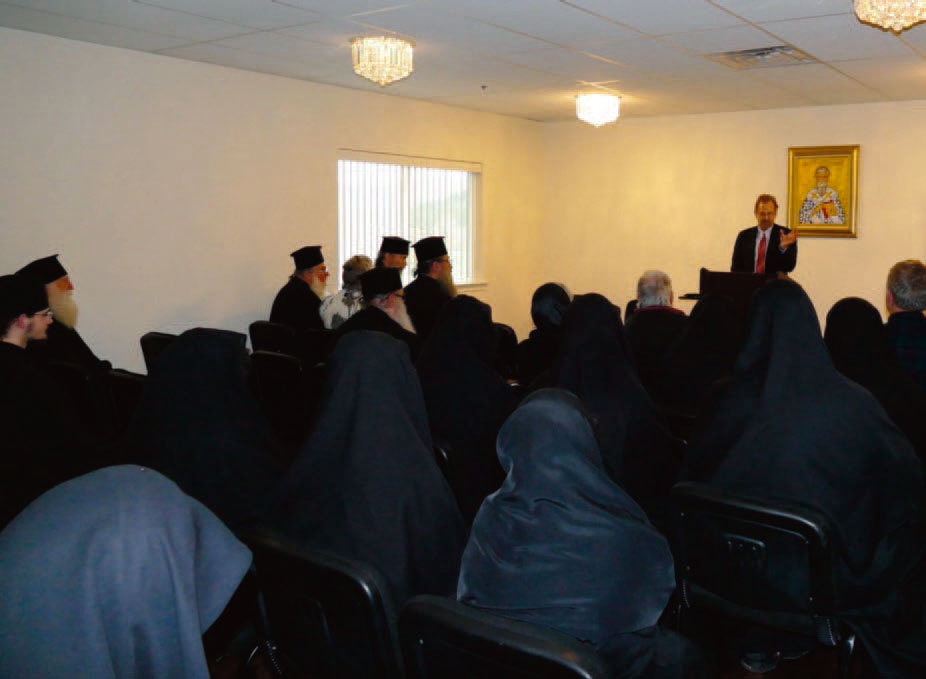
Professor Merrill is also a veteran of cultural diplomacy, having visited, lectured, and taught, primarily under the sponsorship of the U.S. Department of State, in more than fifty countries. He is a member of the U.S. National Commission for UNESCO and received a presidential appointment under the Obama administration to the National Council on the Humanities. In addition to such recognition for his work and many prizes for his poetry and books, which have been translated into some fourteen languages, Merrill was knighted by the French government into the Order of Arts and Letters.
Following his lecture, Professor Merrill spent several days at the nearby St. Gregory Palamas Monastery, attending services and visiting with Metropolitan Chrysostomos, whom he met through the State Department’s Fulbright program almost two decades ago, whereupon the two established a personal friendship and longtime correspondence.
____  ____
____
• March 27, 2017:
Enthronement of Archimandrite Patrick as Abbot
of the Monastery of St. Gregory of Sinai
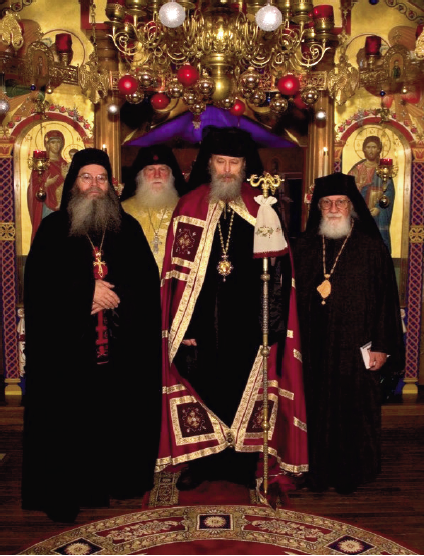
With the retirement, in 2016, of Bishop Sergios, emeritus Bishop of Portland, as Abbot of the brotherhood of the Monastery of St. Gregory of Sinai in Kelseyville, California, Hieromonk Patrick, co-founder of the monastery, was elected as His Eminence’s successor. Subsequently, Father Patrick, elevated on December 30, 2016 (Old Style), to the honor of Archimandrite by His Eminence, Bishop Auxentios of Etna and Portland at the St. Gregory Palamas Monastery, in Etna, CA, was officially appointed Abbot of his brotherhood (see at left, from left to right, the newly elevated Archimandrite Father Patrick, Archimandrite Father Akakios, Abbot of the St. Gregory Palamas Monastery, and Their Eminences, Bishop Auxentios and Bishop Sergios) and his enthronement was appointed for the Vespers Service of the Feast of St. John of the Ladder, Saturday, March 12, 2017 (Old Style), at the monastery in Kelseyville.
On the appointed day of the enthronement ceremony, Bishop
Auxentios made the five-hour trip to the Monastery of St. Gregory of Sinai, an isolated and well-designed community, clearly reminiscent of the best of traditional ascetic monastic houses. It is situated in a heavily forested mountainous area some three hours north of San Francisco. His Eminence was accompanied by the Abbot of the St. Gregory Palamas Monastery, Archimandrite Akakios, three Fathers from the brotherhood, Hierodeacon Photii, Schemamonk Father Vlasie and Schemamonk Father Chrysostomos, as well as His Eminence, Bishop Chrysostomos, former Metropolitan of Etna.
Archimandrite Patrick was enthroned by Bishop Auxentios in a short but deeply moving service at the conclusion of Vespers, chanted by Fathers Vlasie and Chrysostomos. The brotherhood of the monastery then lifted the Abbot, standing in his throne, three times, to the chanting of “Ἄξιος, ἄξιος, ἄξιος” [Worthy, worthy, worthy], after which Bishop Sergios handed over the Abbot’s staff to the community’s new Elder. Thereupon, Father Patrick delivered a short enthronement sermon, expressing his profound gratitude to his Elder, Bishop Sergios, who has guided him throughout his monastic life, his appreciation to his brothers, his indebtedness for the spiritual support of the brotherhood of the St. Gregory Palamas Monastery, and his great pleasure at the score of lay persons present, individuals who have made the monastery their place of spiritual refuge and succor.
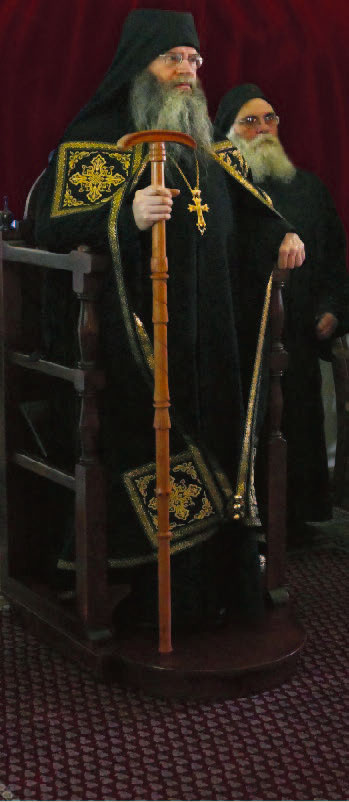
The words of the new Abbot resounded in the hearts of all present at his enthronement service, and the cleansing, purifying, perfecting, and transforming Presence of the Holy Spirit was palpable to all. Bishop Auxentios responded with words of praise for his eloquent remarks, noting that his example of dedication to his gifted and gracious Elder, his humility, and his spiritually centered life and activities bode well for the future of his brotherhood, founded as it is on these pillars and on the impressive sobriety of the monks whom he will serve. He called upon the brotherhood to support and dedicate themselves with renewed vigor to their new Elder, by honoring their now retired spiritual guide in this way.
In a very short expression of his inner feelings, His Eminence, Bishop Chrysostomos exhorted the brotherhood to show obedience to their new Abbot and recited several κρατήματα (kratēmata)—various combinations of syllables (e.g., τεριρέμ, ἀνενά, τοτοτό [terirem, anena, tototo]) chanted at times in Byzantine musical compositions as a kind of exultant “spiritual language”—expressing in this unusual manner his spiritual joy on the occasion. He noted to several present that he was in awe of Father Patrick’s many gifts, especially since, with so many talents, most individuals would be “puffed up” and tempted by arrogance, whereas the new Abbot exhibits such refined signs of humility and careful self-examination and self-reproach.
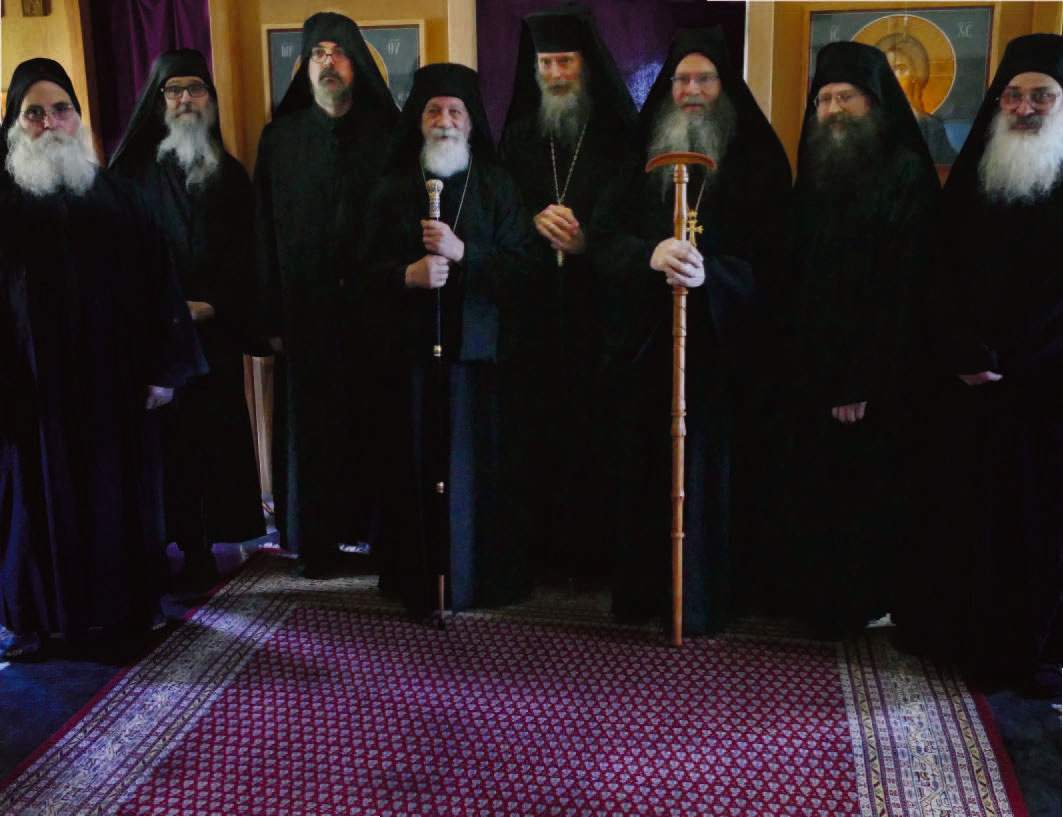
The monastery brotherhood, with Bishop Auxentios at center. At the left of
Bishop Auxentios, Bishop Sergios, at right, the new Abbot, Father Patrick.
At the wonderful fasting meal that followed the enthronement, the Monastery of St. Gregory of Sinai presented a magnificent mosaic Icon, the work of Archimandrite Patrick and a brother of the monastery, Father Theologos, to the St. Gregory Palamas Monastery as a token of its respect for this sister institution. Bishop Chrysostomos accepted this extraordinary gift with great emotion on behalf of the monastery, where, in retirement, he from time to time resides.
The newly enthroned Abbot, Archimandrite Patrick, 59, is a graduate of the Rhode Island School of Design, the premier college of art and design in the United States. A student of Leonid Ouspensky, he is an accomplished and well-known iconographer. He is also the author of the popular work, Recovering the Icon: The Life and Works of Leonid Ouspensky (in his secular name, Patrick Doolan), published by St. Vladimir’s Seminary Press. Father Patrick has taught and lectured on Iconography at the Roehampton Art Institute in England, the Valamo Academy in Finland, and the Patriarch Athenagoras Orthodox Institute at the Graduate Theological Union in Berkeley. He was recently appointed a Lecturer in Iconography at the St. Photios Orthodox Theological Seminary in Etna, California.
With every prayer and great expectations for his spiritual success, we wish Archimandrite Patrick a long, rewarding, and fruitful Abbacy.
____  ____
____
• March 12, 2017:
ORDINATION OF DEACON FATHER JAMES KALBASKY
On the second Sunday of the Great Fast (February 27, Old Style/ March 12, New Style), 2017, Subdeacon James Michael Kalbasky, from the parish of the Holy Nativity of the Theotokos in Portland, Oregon (the designated Cathedral Church of the Diocese of Etna and Portland), was ordained to the Diaconate during the Feast Day Liturgy of the St. Gregory Palamas Monastery, in Etna, California, by His Eminence, Bishop Auxentios, Ruling Bishop of the Diocese.
The newly ordained Deacon Father James holds a B.S. degree in Law Enforcement Administration from Youngstown State University. He also completed the Diploma in Orthodox Theological Studies at the Center for Traditionalist Orthodox Studies (C.T.O.S.), which he received with distinction.
In addition to his wife, Diakonissa Marianne, and daughter, Anna, and number of relatives and several families from the parish, Father Photios Cooper, Rector of the Holy Nativity of the Theotokos Church, to which Father James has been permanently assigned, attended the Ordination Liturgy, in which he took part. Also in attendance at the Ordination were His Eminence, Bishop Sergios, retired Bishop of the Portland Diocese, Archimandrite Patrick and Hierodeacon Moses from the Monastery of St. Gregory of Sinai, and His Eminence, Bishop Chrysostomos, retired Metropolitan of Etna. Metropolitan Chrysostomos also delivered a sermon on the monastery Feast Day, which appears below.
The Ordination was followed by a banquet for some forty-five attendants, held in the cafeteria dining hall of the St. Photios Orthodox Theological Seminary in Etna, the successor school to the C.T.O.S.
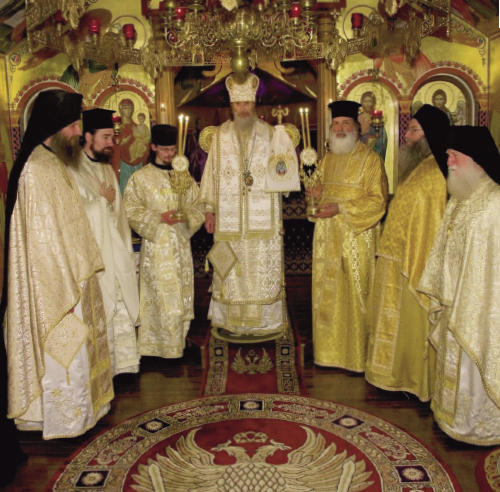
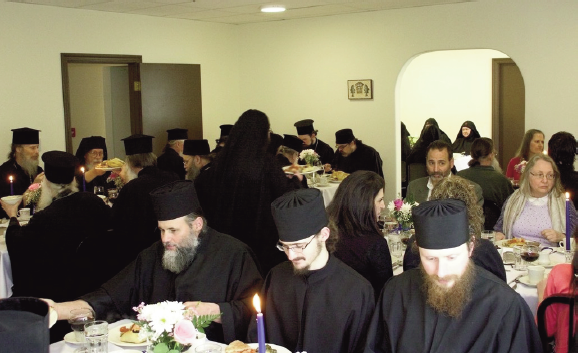
A Sermon on the Feast Day of
St. Gregory Palamas
Great Lent 2017
by the Most Reverend Chrysostomos
Former Metropolitan of Etna
In the Name of the Father, the
Son, and the Holy Spirit.
At the request of His Eminence, Bishop Auxentios, I would like to say a few words about St. Gregory Palamas, whose memory we celebrate today and to whom our monastery is dedicated, and about the Ordination that will occur today.
I would like to begin my remarks by congratulating His Eminence, our Ruling Bishop (properly and historically our “Metropolitan”); all the members of the brotherhood, and especially Archimandrite Gregory, who is celebrating his Nameday today; as well as Father Photios Cooper, the Rector of the small parish in Portland, Oregon, that serves as the Cathedral Church for the Diocese of Etna and Portland, who is celebrating the anniversary of his Ordination on this day. Χρόνια Πολλά! Many Years!
I would also like to congratulate Subdeacon James Kalbasky, whom His Eminence will ordain to the first level of the Apostolic Priesthood, the Diaconate, later this morning in the Liturgy. Subdeacon James is one of the finest students that we ever had in the former theological program of the Center for Traditionalist Orthodox Studies, and he brings great joy to us by his advancement in ecclesiastical service. By anticipation, I wish you—soon to be, by the Grace of God, Deacon Father—James, and your worthy wife—soon to be Diakonissa—Marianne every blessing. Ἄξιος!
I also welcome all of our visitors, as His Eminence will do formally at the Ordination banquet later this afternoon, to our monastic community, my spiritual home in retirement, thanking you for your presence on this auspicious occasion for the monastery and for Subdeacon James. With unbridled joy, I especially welcome His Eminence, the Most Reverend Sergios, retired Bishop of Portland, Archimandrite Father Patrick, who will shortly be enthroned as Abbot of our sister institution, the Monastery of St. Gregory of Sinai, in Kelseyville, California, where Bishop Sergios lives in retirement, and Hierodeacon Father Moses, a brother of the monastery. Lastly, allow me the liberty, which I know that he will grant me, of extending to all of you the blessing of the First Hierarch of the American Eparchy of our Church, Metropolitan Demetrios.
Metropolitan Cyprian of Oropos and Phyle, who resides at the Monastery of Sts. Cyprian and Justina in Phyle, Greece, of which this monastery is a μετόχιον, or dependency, is very fond of quoting what one might call the “mantra,” if I may use that adopted term in a wholly Christian way, of St. Gregory Palamas: “Kύριε, φώτισόν μου τὸ σκότος!” or “Lord, enlighten my darkness!” This was the Saint’s constant imploration, and I would like to use it to introduce a few elementary words about two levels of spiritual life that St. Gregory, the fourteenth-century Archbishop of Thessaloniki and one of the most eminent theologians of the Orthodox Church, so perfectly and perspicaciously illuminated for us: a luminary shedding light on our darkness.
St. Gregory, born into a noble Byzantine family that produced six other monastic Saints, was a theologian and genius who brought praise on himself from the highest representatives of the imperial court. Yet, he chose to serve God as a simple monk, as an ascetic, and even, for a short time, as a cave-dweller. He struggled, like all of us, to please God, to submit himself to the Church, and to come to know God through sincere belief. He internalized, so as to conform his mind and human will to the whispers of God and to God’s Will within his heart, his earthly life of external obedience to, and love for, his family, his colleagues, his monastic brethren, his country, and his fellow man.
In so doing, he surely approached God, initially, as we all do: through the veil of the flesh, with anthropomorphic notions of Him. But he was not, it seems, burdened, as most of us are, by the doubts about God that the Evil One sows in us, prodding us, if not to unbelief, at least to the temptation of grasping God, Who created us, in the dimensions of our own created thoughts and delusions—those created by God creating the Creator in their own image. He had the profound virtue of fearing God, which leads to loving God. And since the love of God dispels doubt, He discovered the God of Uncreated Light, Who transcends, as the Fathers teach, all human images and conceptions.
St. Gregory Palamas, again like all of us, had to contend with those who seek to make the Church an extension of their egos, endowing the institution of the Church with human passions: arrogance, both among the faithful and the clergy, jealousy, resentments, pettiness, the bearing of grudges, the hatred of others in the name of Christ, triumphalism, and proclamations of personal “purity” of confession. (Indeed, what purity of Faith is there in anything that does not lead to love for our enemies, for sinners, and even for heretics, whom we should pine with our whole soul to cure of their spiritual illness?) I am also sure that he saw those who, in their delusion and sick with sin, defile the Church with their passions and perversions, claiming to be holy. And like many of the Martyrs and Saints, he underwent imprisonment, not just during his capture by infidels, but also at the hands of the Church and the Byzantine “Latinizers,” who despised him for his defense of Orthodoxy.
In confronting all of these things at the lower level of spiritual life, which are reflected in the institutional imperfections of the Spotless Church, he taught us a wonderful lesson. He did not cry out with loud cries of righteous indignation; declare his preference for death, in the face of an Orthodoxy assailed by the forces countering it; or place his blame on those who, in all truth, were indeed blameworthy by their actions for his persecution. Rather, turning the blame and responsibility for all that befell him on himself and condemning his own darkness (for the closer we come to God, the more we think ourselves sinful and, in this closeness to the source of Love, forgive and embrace those who do us ill), he inexorably cried out: “Kύριε, φώτισόν μου τὸ σκότος!” “Lord, enlighten my darkness!”
Hearing him, God poured forth the Uncreated Light of His Being on St. Gregory, who had surrendered his heart to God and his mind to spiritual contemplation. The Saint’s heart became a burning flame, a luminous torch of mystical insight, and a repository of wisdom. This transformed him, those who followed him, and the world around him. God, the wholly ineffable God, Being Itself, was revealed in the heart and purified mind and emotions of St. Gregory, such that he became one with the Divine Energies of God. He was united by Grace to Christ, became a “small Jesus Christ” within Jesus Christ, and came to know in an unknowable way the God Who is and is not, Whose “Isness” surpasses our categories of existence and non-existence, Who is Being itself, and Who reveals Himself to those whom He indwells with the deafening thunder of a spiritual silence unheeded by the world.
If, in this higher spiritual life, St. Gregory Palamas had a motto that is everywhere present in his writings and teachings, it would surely be the affirmation that he made in advice given to a certain nun: the affirmation that “Ζωὴ δέ ἐστι τῆς ψυχῆς, ἡ πρὸς τὸν Θεόν ἕνωσις, ὥσπερ καὶ τοῦ σώματος ἡ πρὸς ψυχήν ἕνωσις; that is, “The life of the soul is union with God, just as the life of the body is union with the soul.” When we unite our bodies to our souls, and then our souls to God, this union with Love in God bequeaths to us a New Life and an inner vision of things spiritual that changes—I should say, wholly transforms—our understanding of God and the Church.
We no longer believe in God, struggling with the impediments of the arrogant human intellect, the pull of the passions, or the heavy, depressing weight of doubt; rather, we live within God, communing with His Divine Energies, united by Grace with Christ, becoming true inheritors and sons and daughters of God. Taking our existence from within His Being, we pass from believing in God to finding the reality of our existence in Him, embracing Him through Jesus Christ, with Whom the Father is One, as our Father by adoption and the source of what we were truly meant to be: perfect servants and children of our unknowable Father, Whom we have seen in His Son, the Archetype of our own
true nature.
The Church, in the loftier Life of Christ, is not just a gathering. It is not just a place where we worship and approach God. It not just a place of fellowship. It is not just a place where our imperfect human personalities join with others to strive towards a knowledge of God. It is not that institution so beset with human foibles and passions that even the Evil One finds a corner in it from which to throw his darts and arrows. It becomes, for those who are enlightened, the “house of God,” sacred space, a “spiritual wormhole” from one realm to another, and the place where we encounter God in awe. It is for this reason that we make the Church splendorous and rich, since we match the finest and purest of what we have on earth with the ineffable, unspeakable beauty that shines forth, in this sacred space, from God. What our human efforts at beauty fail to provide, God gives us by his Love and Grace.
In the higher life of the Church, we are lifted up, transformed, bound to one another, and protected and perfected by the Mysteries that are performed there. In the Church, we find the nucleus of human life: the source of all that we seek and need. We seal it off and remove it, if we fully understand it, from all that is “everyday” and common. We become inebriated on its New Wine, which does not pollute the mind, but cleanses the senses, purifies the emotions, and brings us noetic joy and exultant sentiments that burst forth in tears that flow over the soul like nectar over an already ripened and sweet fruit. In the end, when we realize the fullness of life that is contained within the Church, it is no longer a window into another world; it becomes a door from the antechamber of our false life into true life. The institution of the Church fades as its essence shines forth with transforming beams of light.
St. Gregory Palamas, therefore, brings together our earthly life with eternal life. If we heed him, we rejoice where we are: monastics dancing with joy at what they taste and what they will one day, in the other life—which has already invaded this life—feast upon, the lay people joining them in this dance. St. Gregory brings life and afterlife together in Christ; he takes us from struggle to triumph, and he gives us a glimpse, even in this life, of what awaits us in the return to our True Home and our True Father.
Let me finally say to Subdeacon James, whose soul is pregnant, at this moment, with the Priesthood, that he, like all but the very best of us, will serve in the Priesthood by oikonomia, burdened by imperfections and past sins. In knowing so and feeling this pain, I urge him to call out to God for forgiveness. If he will do this until his last breath, God will, in the course of his struggles, grant him, from time to time, by virtue of the Grace of Priesthood, a higher vision and an experience of higher things. Hold on firmly to your gift, at such moments, and moving from a plea for forgiveness, thank God with tears for the gift of union with Him in your inner man, touched by God’s Grace. Like St. Gregory Palamas, who passed from pleading for light to shining forth with light, as those who saw and knew him in his time attest, you will find great comfort and honor in the Saint whom we today honor and who will, without doubt, bless your Ordination.
____  ____
____
• January 12, 2017:
Photographs of the Elevation of Archimandrite Patrick
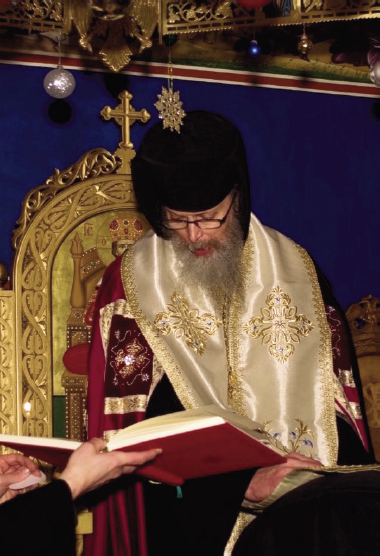

Left, His Eminence, Bishop Auxentios; right, (left to right) Archimandrite Patrick,
Archimandrite Akakios, Bishop Auxentios and Bishop Sergios.
____  ____
____
• January 12, 2017:
Retirement of His Eminence, the Most Reverend Sergios, Bishop
Emeritus of Portland, from the Office of Abbot of the Monastery
of St. Gregory of Sinai, in Kelseyville, California, and the
Elevation of Hieromonk Patrick to the Rank of
Archimandrite and Appointment as Abbot
Designate of the Monastery
Much to the regret of the ruling Bishop, clergy, and faithful of the Diocese of Etna and Portland, on November 28 (Old Style)/December 11 (New Style), 2016, His Eminence, the Most Reverend Sergios, emeritus Bishop of Portland, tenured his resignation as Abbot of the Monastery of St. Gregory of Sinai in Kelseyville, California. Citing age-related issues, Bishop-Abbot Sergios, 75, is retiring after thirty-three years of serving the brotherhood, which grew from a small brotherhood of two, first established in Brighton, MA, to its present vibrant brotherhood of seven monks in the mountains of Northern California. The Brotherhood lives an essentially Athonite monastic life, engaged in iconography and other monastic handicrafts, while at the same time serving the diocese in a missionary capacity.
His Eminence, a graduate of the University of Connecticut, Fordham University, and St. Vladimir’s Theological Seminary, was, like our own Bishop Auxentios, a student of the renowned Russian theologian, Father Georges Florovsky. He was ordained a Priest in the Orthodox Church in America (OCA) in 1969, thereafter spending a year at the Monastery of St. John the Forerunner, in Essex, England, and another year at the Simonopetra Monastery on Mt. Athos. He returned to the U.S., where he served with distinction at various OCA parishes until 2000, when, conflicted by the calendar reform and Orthodox involvement in the ecumenical movement, he returned to the Old Calendar, and in 2004 was consecrated to the Episcopacy.
In 2011, His Eminence was received into the Church of the Genuine Orthodox Christians of Greece. Two years later he was appointed Bishop of Portland, retiring from his See in 2015. In retirement, he resides at the monastery which he helped found, where he will continue to live as its first and former Abbot. Having taught previously at the University of Alaska Southeast, Bishop Sergios is a Professor of Theology and Church History at the St. Photios Orthodox Theological Seminary in Etna, CA. In addition to continuing his scholarly activities, he serves as a vital and indispensable advisor to the Bishop and Diocese of Etna and Portland.
At Bishop Sergios’ retirement, the brotherhood of the Monastery of St. Gregory of Sinai elected, as his successor, the co-founder of the monastery, Hieromonk Patrick, 59, who has been a constant disciple and helper to his Elder. Thus, on December 30, 2016 (Old Style)/January 12, 2017 (New Style), His Eminence, Bishop Auxentios elevated Father Patrick to the rank of Archimandrite at the St. Gregory Palamas Monastery, officially appointing him Abbot of the St. Gregory of Sinai Monastery. The Abbot-elect will be enthroned on March 25, 2017 (New Style) at the Kelseyville monastery.
Archimandrite Patrick is a graduate of the Rhode Island School of Design, the premier college of art and design in the United States. A student of Leonid Ouspensky, he is an accomplished and well-known iconographer. He is also the author of the popular work, Recovering the Icon: The Life and Works of Leonid Ouspensky (by Patrick Doolan), published by St. Vladimir’s Seminary Press. Father Patrick has taught and lectured on Iconography at the Roehampton Art Institute in England, the Valamo Academy in Finland, and the Patriarch Athenagoras Orthodox Institute at the Graduate Theological Union in Berkeley. He was recently appointed a Lecturer in Iconography at the St. Photios Orthodox Theological Seminary.
We wish Bishop Sergios “Many Years” and Archimandrite Patrick a long, rewarding, and spiritually fruitful Abbacy.
